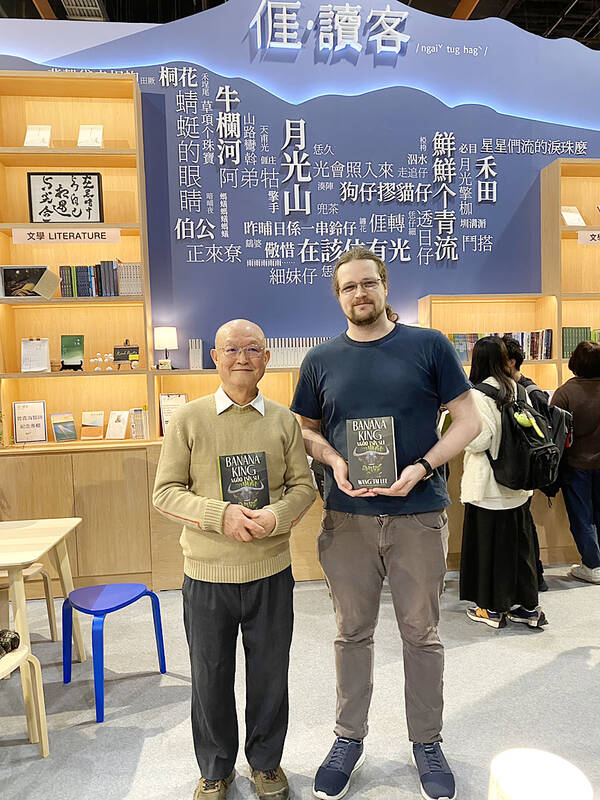Taiwanese novel Banana King Ngoo Tsin-Sui (蕉王吳振瑞) by Lee Wang-tai (李旺台) has drawn the attention of international literary critics, entering consideration for two separate awards.
The novel, translated by Timothy Smith, who is also a translator for the Taipei Times, was placed as the finalist in last year’s Foreword INDIES Book of the Year Awards for the Multicultural and Historical categories, and has been longlisted for the PEN Translation Prize.
Finalists for the PEN Translation Prize are to be announced before May 8, the day of the Literary Awards Ceremony in New York.

Photo courtesy of the Hakka Affairs Council
Lee said he wanted to accurately portray Taiwan and its people in his novels, and was delighted that his works would allow foreigners to better understand the country.
“I hope Banana King would advance to the final stage and beyond, and continue to move and draw in more international readers to learn about Taiwan and its history, tragedies and triumphs,” Smith said.
The novel’s message on authoritarianism and machinations of “malicious actors” is “pertinent and timely,” providing readers with food for thought on the current social and political developments around the world, as well as how fairness, justice and social uplifting are defined, he said.
The novel’s portrayal of the protagonist and his acquaintances’ resourcefulness highlights the tenacity and perseverance of all Taiwanese, he added.
Smith said part of the challenge in translating the book was the rendition of the original work’s use of Hoklo, commonly known as Taiwanese, alongside portions in Japanese and Hakka, maintaining characters’ perspectives and voices through their own language as they would have spoken it rather than through Chinese alone.
Smith expressed discomfort at “conceal[ing] or pav[ing] over these voices by only using Chinese,” adding that these elements tied into scenes depicted in the novel’s second part of “Chinese-language teachers and their [parochial] attitudes toward multicultural Taiwanese, and Taiwanese national identity and affinity.”
The historical novel is based on the story of Ngoo Tsin-sui (吳振瑞), who created a successful banana-based business that at one point provided the majority of Japan’s banana imports, but was later accused of corruption and jailed after becoming embroiled in political disputes.
Ngoo later received a private apology from government representatives.
While approached by others who sought to right a historical wrong, Ngoo chose to let the past stay behind him, spending his last years in Japan.

Trips for more than 100,000 international and domestic air travelers could be disrupted as China launches a military exercise around Taiwan today, Taiwan’s Civil Aviation Administration (CAA) said yesterday. The exercise could affect nearly 900 flights scheduled to enter the Taipei Flight Information Region (FIR) during the exercise window, it added. A notice issued by the Chinese Civil Aviation Administration showed there would be seven temporary zones around the Taiwan Strait which would be used for live-fire exercises, lasting from 8am to 6pm today. All aircraft are prohibited from entering during exercise, it says. Taipei FIR has 14 international air routes and

Taiwan lacks effective and cost-efficient armaments to intercept rockets, making the planned “T-Dome” interception system necessary, two experts said on Tuesday. The concerns were raised after China’s military fired two waves of rockets during live-fire drills around Taiwan on Tuesday, part of two-day exercises code-named “Justice Mission 2025.” The first wave involved 17 rockets launched at 9am from Pingtan in China’s Fujian Province, according to Lieutenant General Hsieh Jih-sheng (謝日升) of the Office of the Deputy Chief of the General Staff for Intelligence at the Ministry of National Defense. Those rockets landed 70 nautical miles (129.6km) northeast of Keelung without flying over Taiwan,

City buses in Taipei and New Taipei City, as well as the Taipei MRT, would on Saturday begin accepting QR code payments from five electronic payment providers, the Taipei Department of Transportation said yesterday. The new option would allow passengers to use the “transportation QR code” feature from EasyWallet, iPass Money, iCash Pay, Jkopay or PXPay Plus. Passengers should open their preferred electronic payment app, select the “transportation code” — not the regular payment code — unlock it, and scan the code at ticket readers or gates, General Planning Division Director-General Liu Kuo-chu (劉國著) said. People should move through the

The Ministry of National Defense (MND) today released images of the military tracking China’s People's Liberation Army (PLA) movements during the latest round of Chinese drills around Taiwan. The PLA began "Justice Mission 2025" drills today, carrying out live-fire drills, simulated strikes on land and maritime targets, and exercises to blockade the nation's main ports. The exercises are to continue tomorrow, with the PLA announcing sea and air space restrictions for five zones around Taiwan for 10 hours starting from 8:30am. The ministry today released images showing a Chinese J-16 fighter jet tracked by a F-16V Block 20 jet and the